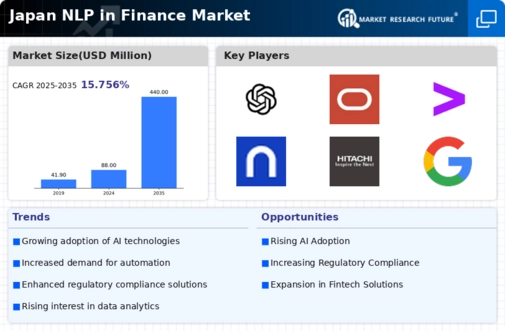Growing Demand for Automation
The increasing need for automation in financial services is driving the nlp in-finance market in Japan. Financial institutions are under pressure to enhance operational efficiency and reduce costs, leading to a surge in the adoption of automated solutions. NLP technologies facilitate the automation of various processes, such as customer service interactions and compliance checks, which can significantly lower operational expenses. A recent study suggests that automation can reduce costs by up to 30% in certain financial operations. As organizations strive to streamline their workflows, the nlp in-finance market is poised for growth, with more firms investing in NLP-driven automation tools to stay competitive.
Technological Advancements in NLP
The rapid evolution of technology in Japan is a pivotal driver for the nlp in-finance market. Innovations in machine learning and artificial intelligence are enhancing the capabilities of NLP systems, allowing for more sophisticated data analysis and interpretation. As financial institutions increasingly adopt these technologies, the demand for advanced NLP solutions is expected to rise. Reports indicate that the market for AI in finance is projected to reach approximately $6 billion by 2025, with NLP playing a crucial role in this growth. The integration of NLP tools enables better customer insights and improved risk management, thereby transforming traditional financial practices. Consequently, the nlp in-finance market is likely to experience significant expansion as organizations seek to leverage these advancements.
Rising Importance of Data Security
In the context of the nlp in-finance market, the emphasis on data security is becoming increasingly critical. Financial institutions in Japan are facing heightened scrutiny regarding data protection and privacy regulations. As a result, there is a growing demand for NLP solutions that not only analyze data but also ensure compliance with stringent security standards. The implementation of NLP technologies can aid in identifying potential security threats and automating compliance reporting, thereby mitigating risks associated with data breaches. This focus on security is likely to propel the nlp in-finance market forward, as firms prioritize solutions that enhance both operational efficiency and data integrity.
Increased Investment in Fintech Startups
The surge in investment in fintech startups is a notable driver for the nlp in-finance market. Japan has witnessed a significant influx of venture capital into the fintech sector, with investments reaching approximately $1.5 billion in 2025. Many of these startups are focusing on developing innovative NLP solutions that cater to the evolving needs of the financial industry. This influx of capital is fostering a competitive landscape, encouraging established financial institutions to collaborate with or acquire these startups to enhance their technological capabilities. As a result, the nlp in-finance market is likely to benefit from this dynamic environment, with new and innovative solutions emerging to address market demands.
Shift Towards Personalized Financial Services
The trend towards personalized financial services is significantly influencing the nlp in-finance market. Consumers in Japan are increasingly seeking tailored financial products and services that meet their specific needs. NLP technologies enable financial institutions to analyze customer data and preferences, allowing for the creation of customized offerings. This shift is reflected in the growing investment in customer analytics tools, which are projected to reach $2 billion by 2026. By leveraging NLP, firms can enhance customer satisfaction and loyalty, ultimately driving growth in the nlp in-finance market. As personalization becomes a key differentiator, the demand for advanced NLP solutions is expected to rise.
















